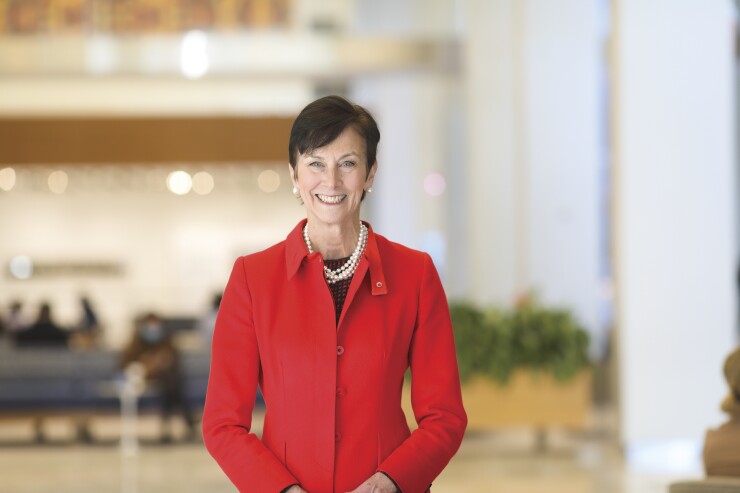
When Karen Peetz joined Citi in 2020, she was returning to work after three and a half years of retirement from a career that included leadership positions at Bank of New York Mellon, where she led the financial markets and treasury services group, and at JPMorgan Chase, where she had a variety of commercial lending, sales, and management positions.
Just four months into her new job, Citi was hit with two consent orders and a $400 million civil penalty for its "longstanding failure to establish effective risk management," according to federal regulators.
In cooperation with newly appointed CEO Jane Fraser, Peetz spent 2021 working to fix those problems to regulators' satisfaction. The effort, called "The Transformation," is Citi's effort to modernize the bank across regions, businesses, and functions, in ways that both address regulator concerns and make sense for Citi's ongoing businesses. "We're building a better bank for the long term," Peetz said. "There are lots of moving parts and lots of big rocks to move."
Peetz is leading a cross-enterprise effort to address the root causes of problems while also automating and simplifying company processes. Making sure that Citi has the proper controls in place is just one part of the job.
Improving data governance, including evaluating existing data and labeling it consistently, is also a significant part of the project. So is redesigning key processes. Before this effort began, different parts of Citi's enormous operation had their own processes, such as cross-border payments. Peetz's team is turning these multiple methods into single, simplified end-to-end processes that score well against benchmarks. The business is also updating its systems and training teams on the new technology.
Citi is taking a double-pronged approach to how it manages risk going forward. On the one hand, Peetz is creating a centrally-led discipline and structure to Citi's project management practices. On the other hand, she's also working to reset the bank's cultural approach to employees by expecting workers to take ownership for managing risk and controls.
For Peetz, the result has been an unexpected capstone experience.
"This is my 40th year in banking," she said. "There aren't too many other Citi leaders with that many years under their belts. I worked at Chase and at BNY Mellon, I was on the board of Wells Fargo, and then I came to Citi."
When she came out of her 2016 retirement to take her current job with Citi, it felt like a culminating experience for her. "How could I not do it?" she asked. "It's been a way to pull together every experience I ever had in the prior 38 years. Who gets a chance to do that?"
As Peetz looks back on 2021, she says that she's most proud of how Citi employees, both new and long established, have come together to work as a single team. "I'm a people person, and I love human motivation, focus, teamwork, and leadership," she said. "Work can be arduous, but I get a buzz out of the people part of it. There's a fierce determination and a real never-say-die spirit."
Peetz is confident that Citi will come out of this experience as a better, more efficient organization. That's in part because her team has senior support and recognition, she said, including a transformation oversight committee and applause for each milestone met.
Peetz's confidence and self-assurance can be attributed, in part, to her early years as an athlete. "I played field hockey and lacrosse during the first year of Title IX at Penn State," she said, noting that she had athletic scholarships for both sports. "I started in 1973 and had quite a feminist coach for both sports. She felt that we were equal and by golly, we would be treated that way. When the football team got new uniforms, we got new uniforms. It created a sense in me of 'Why wouldn't I get to do the things I want to do?'"





